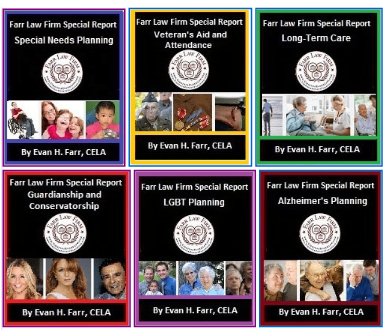Living with Fewer Rights than a Convicted Felon
If you cannot view the image below, please read the article on our blog.

Q. My 30 year old cousin, Donnie, is intellectually disabled. He works at the Wendy's near my house, serving burgers and greeting customers with a smile. He has a bank account, and saves most of the money he earns, makes a mean chili, and drives to work each day. Yet, his mother has guardianship over him, leaving him with less rights than a convicted felon.
All Donnie wants is to be independent and the interesting twist in his situation is that his mother agrees with him. She wants him to find the apartment he's been saving for, and to be independent, as he wishes. However, the court disagrees, and will not remove the guardianship. In addition, if anything happened to his mother, Donnie’s guardianship would revert to the courts, and he could be forced out of his mother's house and into a group home, be forced to quit the job he
loves, be cut off from friends, and even have all his passwords to his favorite websites blocked.
This is unbelievable! Is this the norm? What is being done to help people like him?
A. Guardianship is an extreme form of intervention in another person’s life, that is typically used for those who are mentally incapacitated due to dementia, brain injury, mental illness, or other disability. For an incapacitated adult, a "guardian" is a person that is appointed by the court to be responsible for another person's personal affairs, including making decisions regarding their support, care, health, safety, habilitation, education, therapeutic treatment, and
residence.
The law does not make it easy for someone to obtain guardianship, unless the person they are trying to help really needs it, because doing so takes away so many legal rights of the protected person, including control over personal and/or financial decisions for an indefinite, often permanent period of time. As you can see in the situation with your cousin, once established, guardianship can be quite difficult to revoke. This is why I advise that guardianship should only be used as a last
resort.
Supported Decision-Making
Currently, there is a nationwide movement to replace overbearing guardianships with something called Supported Decision-Making (SDM). SDM is designed to make the person with cognitive challenges “the ultimate decision-maker,” while still providing the support the person needs to thrive, according to the National Guardianship Association.
SDM offers an opportunity for many adults with disabilities to make their own decisions, consistent with fundamental human and legal rights. For example, with SDM, someone such as your cousin would be able to make life decisions for himself, while still receiving the help he needs to understand the choices he faces. All this, without the need for undue or overbroad guardianship.
Introduced as part of the United Nations Convention on the Rights of Persons with Disabilities (CRPD), SDM can be a key element for improving experiences and opportunities for many people with different life conditions. In fact, according to the American Bar Association website, under Article 12 of the UN CRPD, people with disabilities enjoy "legal capacity to
act on an equal basis with others in all aspects of life. States have a duty to provide persons with disabilities access to the supports they may require to exercise their legal capacity. States must ensure that these measures provide for safeguards to prevent abuse that are both proportional and tailored to the individual’s circumstances."
The legal group that met at the UN CRPD came to a consensus that SDM, with adequate resources, must be put in place before guardianship, and that guardianship should only be considered if SDM has not succeeded. Unfortunately, SDM is generally not known to the general public, policymakers, judges, and many lawyers. A model for SDM currently exists in British Columbia, however, there is generally no clear policy framework in the
U.S. Therefore, guardianship laws and practice still dominates in this country. The challenge for leaders is to identify the steps they can take within their scope of influence AND work with others to create new SDM policies, systems and practices.
What To Do Until SDM Becomes Mainsteam
Very few people want to have court oversight and be unable to make decisions without getting someone else’s permission. For your cousin, I sincerely hope SDM becomes available in this country. For others, not wanting their rights taken away is a big reason why proper legal planning is so important. The very same protections achieved through guardianship can usually be achieved without any court proceeding, through the use of good Power of Attorney documents for medical and financial
decisions. If you and your loved ones don’t already have up-to-date power of attorney documents in place, then it’s critical to do so right away.
Please click here for additional details about guardianship and less restrictive alternatives.
Special Needs Planning
Until something can be done to help your cousin regain his independence, it is important for his family to plan for his future.
A special needs trust is an essential tool to protect a disabled individual’s financial future. Also known as Supplemental Needs Trusts, this type of trust preserves legal eligibility for federal and state benefits by keeping assets out of the disabled person’s name while still allowing those assets to be used to benefit the person with special needs. Read more here.
When it comes to special needs planning and guardianship, we can guide families through this process and discuss the best strategies/alternatives. Please call us to make an appointment for a no-cost consultation:
Fairfax Elder Law: 703-691-1888
Fredericksburg Elder Law: 540-479-1435
Rockville Elder Law: 301-519-8041
DC Elder Law: 202-587-2797
-----
Critter Corner: Special Care for a Special Needs Parent

Dear Angel,
My daughter, Valerie, has autism spectrum disorder (formerly known as Asperger's Syndrome, but now under the ASD umbrella). She is very bright, and for the most part is in an inclusive environment at school. However, when she gets home, she has panic attacks often, and needs constant attention. I spend all of my time thinking about her needs, and no time on myself, and the stress is taking a toll on my mental and physical health. Do you know of
any suggestions for finding caregiving help/respite for a special needs parent? I don't trust just anyone with my daughter, and really need some time to go for a run, read a good book, or just to unwind.
Thanks in advance,
Alla Boutval
----
Dear Alla,
Being a parent is stressful. And, as you know, being a special-needs parent can be challenging. Below are some resources for finding qualified caregivers and respite programs, so you can make time to care for yourself and relieve some stress!
Caregiving
•Start with your family, friends, neighbors, and your child’s classmates’ parents. Anyone of these might have a great connection that they never thought of until you asked.
•Ask for childcare recommendations from any of the online autism parent groups you belong to.
•Put a “childcare needed” notice in nearby religious institutions such as churches or synagogues, in your local library, and in colleges or universities with special education programs.
•Ask your child’s pediatrician, teachers, early intervention workers, and therapists for recommendations. See if the aides in your child’s class, or the assistants in your child’s toddler group, are allowed to babysit.
•Search online for special needs’ caretakers, and also look into nanny and child care referral agencies. Be sure to ask for references from other parents who have used their services.
•Contact your local chapter of the following groups that provide support and services to people with disabilities and their families.
- The Arc of Northern Virginia: www.thearcofnova.org, 703-532-3214
- Autism Society of Northern Virginia: www.asnv.org,
703-495-8444, executivedirector@asnv.org
- Parents of Autistic Children of Northern Virginia: www.poac-nova.org, 703-391-2251, Concerns@POAC-NoVA.org
Respite
•Arch Respite provides an online database of respite providers in your area, and also explains out how to pay for respite, available Medicaid Waivers, eligibility criteria for various state funding sources, and links to sites where you can apply for funding or get more information.
•The Child Autism Parent Café has some creative ideas for getting good respite providers for your child.
•You can also search Care.com for babysitters and nannies in your area who have experience with children with special needs.
•Autism Speaks has suggestions for how to find a respite worker, and also offers a database that you can search for caretakers in your area.
•Child Care Aware is a nonprofit agency with a searchable database of local child care resource and referral agencies. They can also help you find quality child care when you call them at (800) 424-2246.
Putting You First
Once you get used to taking a little time for yourself, you will find that it becomes part of your daily routine, which you won’t want to skip. The benefits to you and your family are well worth it. Now is the perfect time to make a commitment to yourself and improve your life, so go for it!
Purrs and kisses,
Angel
--------
Sign up for our FREE Special Reports and get the answers to your burning questions! Just click on a cover below!

|
| Special Offer |
|
We’re Giving Away My Best-Selling Books – Click Here to Find out Why and to Get Your Free Copies
|
| |
| Find Us |
|
|
| Upcoming Events |
|
Our upcoming Living Trust Plus: How to Protect Your Assets from the Expenses of Probate and Long Term Care seminar is on October 10, November 21, or December 12 in Fairfax.
----------
|
Article Reprint Authorization
|
We invite you to reprint our articles to bring helpful content to your readers, with the following guidelines:
-The article is to be printed in its entirety;
-Additions, deletions, or changes in the text, title or illustrations may not be made;
-Credit is given to The Law Firm of Evan H. Farr, P.C., as the original source.
Example:
Source: Reprinted from The Law Firm of Evan H. Farr, P.C. Newsletter (www.FarrLawFirm.com).
|
|
Mailing Address
|
Fairfax:
10640 Main Street
Suite 200
Fairfax, VA 22030
703-691-1888
Fredericksburg:
511 Westwood Office Park
Fredericksburg, VA 22401
540-479-1435
Rockville, MD:
1 Research Court
Suite 450
Rockville MD 20850
301-519-8041
Washington, DC:
1425 K Street, NW
Suite 350
Washington, DC 20005
202-587-2797
|
|











